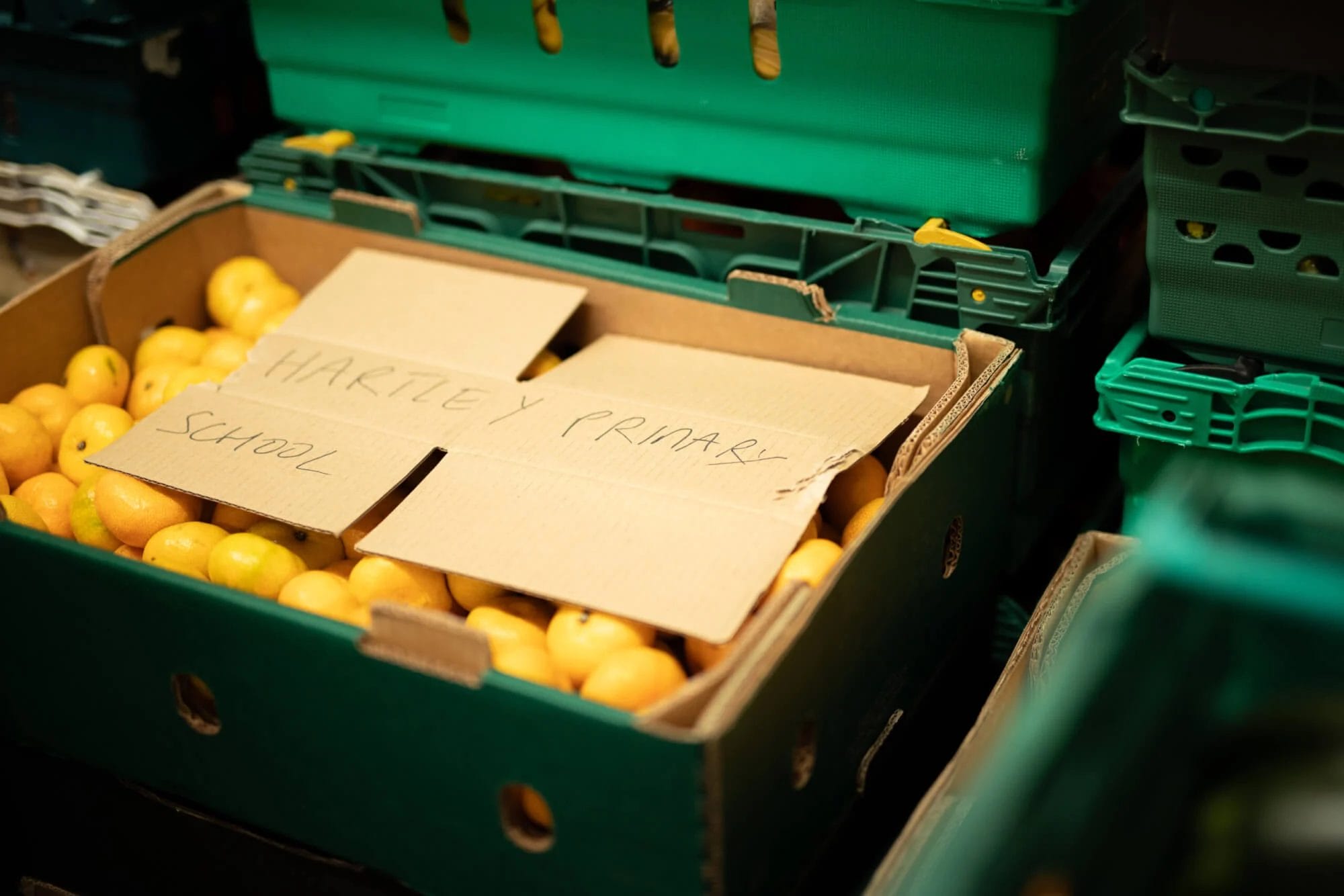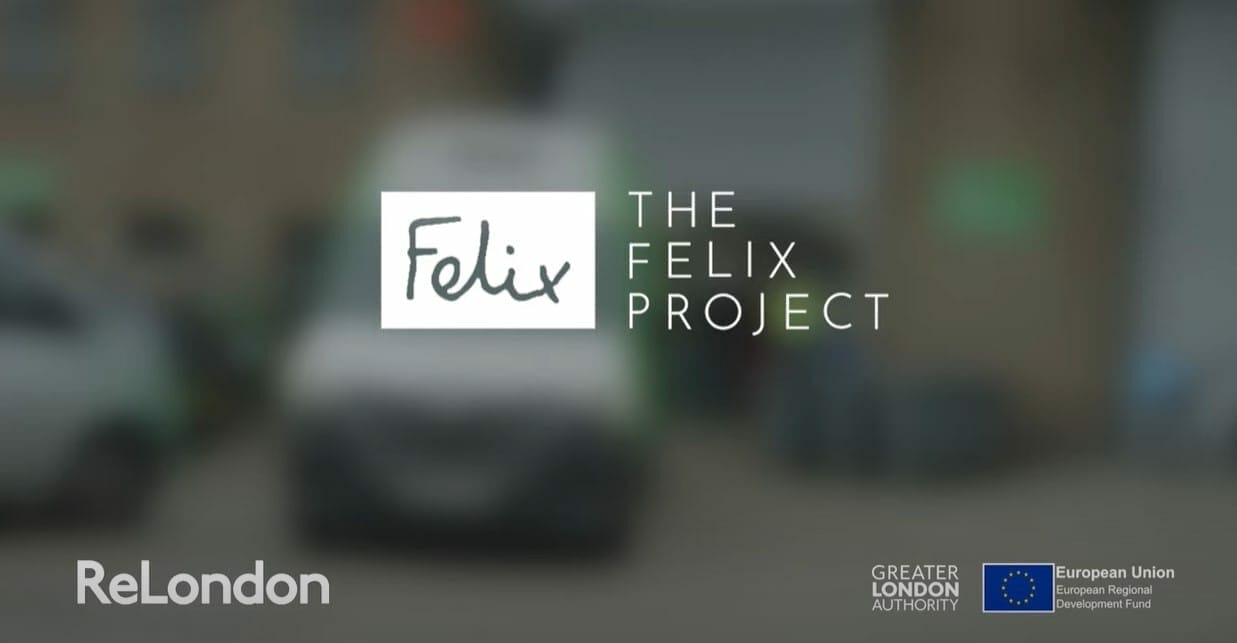The Felix Project is a food redistribution charity that rescues good quality, nutritious food from the food industry (e.g. supermarkets, wholesalers, restaurants) and redistributes it for free to frontline charities and holiday programmes across London. They saw an opportunity to tackle more food waste while amplifying social good by expanding their operations to include food preparation, thus creating Felix’s Kitchen.
In August 2021, The Felix Project was awarded a grant of £10,000 from the Mayor of London’s Green New Deal fund and advisory support from ReLondon’s ERDF-funded business transformation programme, towards the ongoing development of Felix’s Kitchen, launched one month earlier. With this help, they were able to set up a social kitchen to transform even more surplus produce into nutritious meals for disadvantaged communities in east London and beyond.
Between July 2021 and December 2022, Felix’s Kitchen prepared 1.3 million meals, preventing 516,428 kg of surplus food from going to waste and emissions of 1,311,727kg CO2e. They’ve also created training and job opportunities for 23 employees, including individuals not previously in employment, education, or training.
The project was awarded Circular Food Pioneer Project status by the Food Flagship Initiative in recognition of its contribution to driving food system transformation.
What was the challenge?
Research from ReLondon shows that roughly 2.3 million tonnes of food are lost or wasted across London’s food supply chain each year. More than two-thirds of the food wasted is edible yet concerningly, less than 0.5% was redistributed in 2019.
The Felix Project has been part of the solution to this problem since 2016. They rescue good quality, nutritious food from the food industry (e.g. supermarkets, wholesalers, restaurants) and redistribute it for free to frontline charities, primary schools and holiday programmes across London. These items include fresh fruit; vegetables; baked goods, and meats that are safe to eat but cannot be sold and would otherwise go to waste.
Unfortunately, in the past they have often had to refuse large quantities of surplus food because it could not be accepted by receiving organisations, either because the items were too close to expiry date, or the volume was too bulky or impractical for the organisations to process.
The COVID-19 crisis revealed that many individuals and families lack the means to cook hot meals from scratch using fresh ingredients. This is exacerbated by the current cost-of-living crisis, where many Londoners are increasingly suffering from food poverty with an estimated 1.5 million adults experiencing low or very low food security.
What was the response?
In 2021, The Felix Project saw an opportunity to strengthen their social and environmental mission. A former catering kitchen became available next to a new depot they were opening in Tower Hamlets, a perfect outlet combination that they could use to create ready meals out of surplus food that couldn’t be redistributed.
The aim from the outset was to serve nutritious and culturally familiar food to vulnerable people from disadvantaged communities in London. This would bring together their social mission around food poverty with their ambition to tackle climate change.
ReLondon was pleased to award The Felix Project a grant of £10,000 from the Mayor of London’s Green New Deal fund to develop and test Felix’s Kitchen. Felix’s Kitchen became operational in July 2021. Meals are packaged and labelled on site and kept chilled, before being delivered to charity partners and then on to their beneficiaries.

Haringey Housing Related SupportThank you for the delicious weekly meals you provide to our residents, some of whom are homeless or at risk of becoming homeless. You may not realise it, but you are doing much more than filling tummies. You are showing them that there are people who care about them and that gives them hope. Sometimes, hope is all that’s needed to prompt people to change their lives.
What were the outcomes?
In the first 12 months of delivering this project, The Felix Project fine-tuned their processes to ramp up their impact – such as working with their depot staff to identify suitable surplus food items to be used in the kitchen; adding two dedicated volunteer managers: one for the Poplar operation to engage with the local community to recruit more local volunteers; and the second one to engage with companies keen to have teams of employees volunteer at the depot and the kitchen. They also invited people from the local community to teach their chefs new culturally familiar recipes from different cuisines.
In the first six months they cooked nearly 300,000 nutritious and delicious meals for those in need; and within a year, they scaled up to the incredible milestone of 1 million meals served, assisted by more than 3,491 volunteers.
The initiative has received fantastic publicity, with support from famous chefs such as award-winning author and restaurateur Chantelle Nicholson. They and many people from the local communities have shared recipes to match the preferences and sought-after flavours of those supported by Felix’s charity partners.
In addition, the initiative has created important work and training opportunities for individuals that would otherwise struggle to find employment. Some of their existing apprentices have become members of staff at Felix’s Kitchen, while others are exploring possibilities within the London hospitality industry.


Lessons learned & next steps
In delivering this project, one key challenge that The Felix Project had to overcome is building a dedicated group of volunteers. Most volunteers that volunteer in Felix’s Kitchen are corporate employees who typically help out once, rather than consistently and regularly.
This can make it challenging for the charity to plan operations or stabilise its workforce for scaling. The charity is working hard to build up their volunteer capacity in east London; last year they managed to increase the number of regular kitchen volunteers from 150 to 500. To maximise the capacity of the kitchen they are now adding a third evening shift to their roster so that the kitchen is open for longer, for which they need even more volunteers to come forward.
Drawing on the initial success of Felix’s Kitchen, The Felix Project is now keen to share their learnings with other organisations and develop collaborations with local authorities and community organisations. For example, they will be partnering with the Mayor’s Fund for London to distribute meals to children attending holiday programmes through the ‘Heat & Eat’ scheme.
Since 2021
As of June 2023, Felix’s Kitchen prepares an average of 96,000 meals per month (4,000 meals/day). They now employ 21 members of staff and train two apprentices; and have prepared 1.83 million meals, which translates into 768,984 kgs of surplus food rescued – 1,953,219kgs CO2e.

Get in touch
If you’re interested in learning more about The Felix Project or Felix’s Kitchen and the work they are doing in the nexus between food security, health and sustainability, visit their website or get in touch with their volunteering team if you would like to help them create social impact at volunteer@thefelixproject.org.



